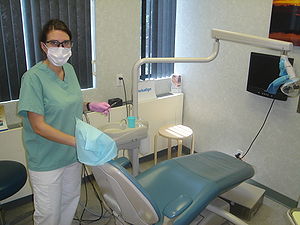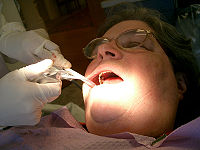- Dental hygienist
-
A dental hygienist (also called oral hygienist) is a licensed dental professional who specializes in preventive oral health, typically focusing on techniques in oral hygiene. Local dental regulations determine the scope of practice of dental hygienists. In most jurisdictions, hygienists work for a dentist, and some are licensed to administer local anesthesia. Common procedures performed by hygienists include cleanings known as prophylaxis, scaling and root planing for patients with periodontal disease, taking of prescribed radiographs, dental sealants, administration of fluoride, and providing instructions for proper oral hygiene and care.
Contents
Dental hygiene process of care
The dental hygiene process of care has five steps:
- Assessing the patient: This includes, but is not limited to, a full review of the patient's medical history, necessary x-rays to be taken, a clinical exam, and a periodontal assessment by probing and exploring areas of the patients mouth. During this stage a thorough documentation must be implemented.
- Dental hygiene diagnosis: Assessing of data pertaining to a client's condition/state in terms that will help identify problems so as to lead to a professional treatment plan/ therapies. The final diagnosis of disease and/or treatments solely lies with jurisdiction and/or approval granted by the doctor.
- Planning: creating a sequential treatment plan for the patient. The treatment plan will vary based on the patient's immediate needs.
- Implementation: Carrying out the plan timely and effectively keeping a strong data base.
- Evaluation: Determining the effectiveness of the treatment plan that was administered. If ineffective a complete evaluation on how to approach the patient's needs differently
Over a period of months or years a dental hygienist may evaluate their clients conditions several times, altering the diagnosis and plan as the client's condition changes.
Training
Australia
See also: dental therapistTo become a dental hygienist in Australia, you must graduate from a dental hygiene program, with either an advanced diploma (TAFE), associate degree, or more commonly a bachelor's degree from a dental hygiene school that is accredited by the Australian Dental Council (ADC).
All dental hygienists in Australia must be licensed by the state in which they practice, after completing a minimum of two years of training.
A Bachelor of Oral Health is the most common degree program. Students entering a bachelor's degree program are required to have a high school diploma or equivalent.
A more advanced level of dental hygiene training can be obtained through combined dental hygiene and therapy programs at some Universities.
Canada
To become a dental hygienist in Canada, you must have completed a 3-year diploma program typically at a local college before you may be registered. Three universities in Canada offer Bachelor of Science degrees in Dental Hygiene: Dalhouise University, University of Alberta, University of British Columbia.[1][2][3]
Dental hygiene across Canada is a well-respected career with many opportunities. These possibilities include working in clinical, administration, education, research and public health positions. The wages vary throughout the country; from approximately $32 per hour in some areas to as high as $55 per hour in others. A surplus of new dental hygiene graduates in recent years has resulted in a decrease in wages in some regions.
Some of the downfalls to practicing in different provinces are the different regulations. For instance in BC the hygienist can not provide treatment without the patient receiving a dental exam in the previous 365 days unless the practicing hygienist has an extended duty module (resident-care module). In AB, BC, MB, and SK, hygienists also administer local anesthesia if qualified to do so.[4][5][6][7] In Ontario you may take further training to become a restorative hygienist. [1]
Dental hygienists in BC, ON, and AB are able to open their own private clinics and practice without a dentist on staff.
United States
To become a dental hygienist in the United States, you must graduate from a dental hygiene program, with either an associate degree (most common), a certificate, a bachelor's degree or a master's degree from a dental hygienist school that is accredited by the American Dental Association (ADA).[2]
All dental hygienists in the United States must be licensed by the state in which they practice, after completing a minimum of two years of school and passing a written board as well as a clinical board exam.
Dental hygienists school programs usually require both general education courses and courses specific to the field of dental hygiene. General education courses important to dental hygiene degrees include college level algebra, biology, and chemistry. Courses specific to dental hygiene may include anatomy, oral anatomy, materials science, pharmacology, radiography, periodontology, nutrition, and clinical skills.
A Bachelor's of Science in Dental Hygiene is typically a four-year program. Students entering a bachelor's degree program are required to have a high school diploma or equivalent, but many dental hygienists with an associate's degree or certification enter the bachelor's degree programs to expand their clinical expertise and help advance their careers.
Graduate degrees in the field of dental hygiene are typically two-year programs and are completed after the bachelor's degree. Common graduate courses in dental hygiene include Healthcare Management, Lab Instruction, and Clinical Instruction.
After completing one of the more than 200 accredited dental hygiene programs in the United States, dental hygienists must be licensed in the state in which they work. Licensure requirements for becoming a Registered Dental Hygienist (RDH) vary from state to state, but most require a two-year degree, a written examination, and a clinical examination. The National Board Dental Hygiene Examination is intended to fulfill the written examination requirements. The clinical examination is typically administered by the state licensing board.
In addition, the American Dental Hygienists' Association has defined a more advanced level of dental hygiene, the Advanced Dental Hygiene Practitioner otherwise known as a dental therapist.
Salaries for dental hygienists in the US vary depending on experience and geographic location. The median hourly wage for hygienists in 2004 in the US was $30.19 per hour.[3]
Dental hygienists have become saturated in many parts of the country. More dental hygiene programs are opening, producing more registered dental hygienists. The career is flexible and provides a wide range of autonomy.
Further reading
- Mueller-Joseph, L., & Petersen, M. (1995). Dental Hygiene Process: Diagnosis and Care Planning. Albany, NY: Delmar.
External links
- Dental Hygienists Association of Australia
- Become a Dental Hygienist – Information on Jobs, Salary and more
- Dental Hygiene degrees at Australian Universities
- How to become Dental Hygienist in USA
- College of Dental Hygienists of British Columbia (CDHBC)
References
- ^ http://www.cdhbc.com/PDF-Files/Tab-5.aspx
- ^ American Dental Hygienists' Association - Education
- ^ "Dental Hygienists", Bureau of Labor Statistics, U.S. Department of Labor, Occupational Outlook Handbook, 2006-07 Edition, (viewed September 28, 2006)
Categories:- Dentistry occupations
Wikimedia Foundation. 2010.


